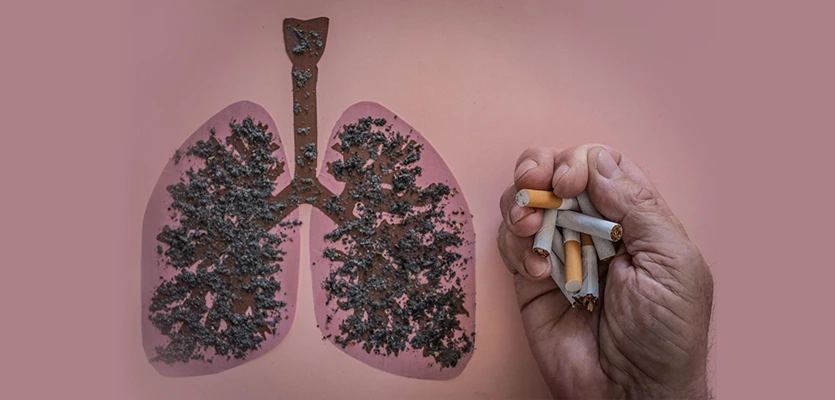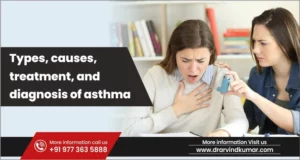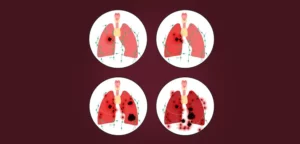If you have never smoked a cigarette in your life, you might believe that its not possible for non-smokers to get lung cancer. Even while your chances of preventing lung cancer are in your favour, some nonsmokers nonetheless get it.
A nonsmoker is someone who has never smoked yet who may have done so at some point in their lives. Those who have never smoked or have smoked fewer than 100 cigarettes in their lifetime are also referred to as never-smokers.
Lung cancer can take distinct forms in smokers and non-smokers/never-smokers; the latter group is more prone to get lung cancer because of a genetic mutation or defect.
The way lung cancer is treated in smokers and non-smokers has evolved during the last five to ten years due to new information.
Before, we believed that all lung cancers were the same, but now we know there are several types. The good news is that there aremedications and therapies available for the types of lung cancer that non-smokers are likely to have since they are typically caused by a molecular alteration or mutation that can be found in the tumour.
Most common lung cancer in non-smokers
The type of lung cancer more common in non-smokers is adenocarcinoma which frequently begins in the bronchioles, the small airways found in the outer regions of the lungs. These bronchioles produce mucus.
One distinction is that malignancies in non-smokers typically advance more slowly. However, even after a successful operation, they still have a chance of returning, even though they may be less likely to spread (or metastasise) to other body parts.
Adenocarcinomas account for 50% to 60% of lung cancers discovered in non-smokers. Squamous cell carcinomas make up 10% to 20% of cases (cancer that forms in the thin, flat cells lining the inside of the lungs). Small cell lung cancers account for just 6% to 8% of lung cancer cases; the remainder is different varieties.
Also read : Lung Cancer in young adults
Symptoms of lung cancer non-smokers
Whether or not you are a non-smoker or not , lung cancer non-smoker symptoms are the same as if you were a smoker with lung cancer. Although most nonsmokers do not exhibit early symptoms of lung cancer, others do, which means that it is frequently not discovered until it has spread.
Some people have persistent fatigue or generalised indications of ill health. Some people cough a lot, cough up blood, or experience wheezing, shortness of breath, or chest pain while they cough.
- a persistent cough that progressively becomes worse
- Coughing up blood
- difficulty in breathing
- Wheezing
- Hoarseness
- reduced appetite
- Weight reduction without cause
- Fatigue
- difficulty in swallowing
- swelling in the neck or face
- pneumonia and other recurring lung illnesses
Other conditions can also present with these symptoms. Consult your doctor if you have any of these signs; they can assist in determining the cause.
Causes of lung cancer for non-smokers
Only a small percentage of lung cancer cases are caused by patients who have no known risk factors. Others may be caused by unknown reasons, while some may just be random occurrences with no external cause.
Exposure to radon, secondhand smoke, air pollution, or other causes can result in lung cancer in nonsmokers. In certain persons who don smoke, occupational exposure to asbestos, diesel exhaust, or some other substances can also result in lung cancer.
Lung cancers in non-smokers frequently differ from those in smokers and tend to manifest in younger people. A genetic mutation in the tumour commonly referred to as a “somatic” mutation, which promotes the growth of cancer, can be one of the most reliable predictors. According to several studies, such somatic mutations or anomalies have been implicated in the development of lung cancer, particularly in non-smokers.
There may be more than one component contributing to the development of the disease in a given case of lung cancer in a nonsmoker rather than just one. The environmental risk factors that contribute to the causes of lung cancer for non-smokers include:
- Radon gas: Exposure to radon gas is thought to be one of the factors contributing to the 21,000 annual lung cancer deaths in nonsmokers. Although radon is odourless and invisible, it naturally occurs outside. It has been discovered in some homes constructed on soil with natural uranium reserves in concentrated levels.
- Secondhand smoke: which has been linked to tens of thousands of fatalities globally, is the smoke you breathe in from someone else using tobacco products. Third-hand smoke, or the film of nicotine and other chemicals that may be left on clothing, walls, furniture, and other surfaces, is another topic of research.
- Agents that cause cancer at work: This is especially important for people who have had recurrent and sustained exposure to carcinogens such asbestos, heavy metals, and diesel exhaust.
- Air pollution: Despite the fact that scientists have linked both indoor and outdoor air pollution to lung cancer, it is thought that the countries where air quality is regulated, have a lower risk of lung cancer than many other nations that do not.
Conclusion
When nonsmokers are diagnosed with early-stage lung cancer, it is typically as a result of “incidental discoveries because routine screenings are not advised for nonsmokers and never-smokers since lung cancer does not exhibit any signs in its early stages and because it is still relatively rare. Most of them had a CT or X-ray done for another reason, and the radiologist noticed something on the lung in most of them. Without ever smoking, lung cancer patients may have a DNA mutation that can be addressed with targeted therapy.
However, if there is a first-degree relative or numerous family members who have had the disease, or if a family member was diagnosed at a young age, people can talk to their doctors if they are concerned about a family history of lung cancer. Concerns regarding exposure to radon, industrial pollutants, secondhand smoke, or other established risk factors should also be raised.
FAQs
1. Is It Recommended to Screen for Lung Cancer in Non-Smokers?
For those who have never smoked, it is advised to not get lung cancer screening. This is because, in this population, the potential risks of screening outweigh the potential advantages of early lung cancer detection.
2. How Can I Reduce My Chance of Developing Lung Cancer?
Avoiding exposure to asbestos, arsenic, some kinds of silica, and chromium as well as secondhand smoking, diesel exhaust, and other air pollutants can help reduce your risk of developing lung cancer. If the radon level in your house is excessive, you should have it tested and take action to reduce it.

.webp)



